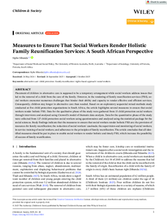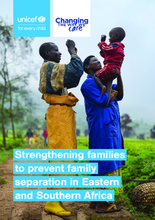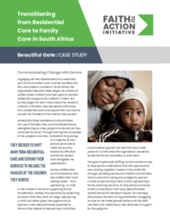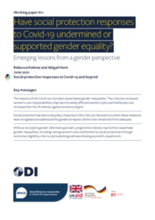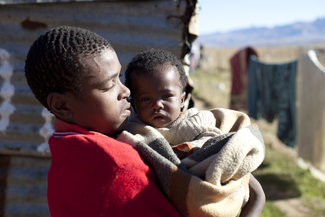

Displaying 1 - 10 of 131
This study examines challenges that hinder social workers in South Africa from providing effective family reunification services, resulting in children staying in alternative care longer than necessary. Findings from a mixed-methods study suggest that providing resources, reducing caseloads, supervising and training social workers, and adhering to reunification principles are key measures to ensure holistic and timely family reunification.
This paper explores strategies to prevent the separation of children from their families, drawing on evidence from Eastern and Southern Africa. It highlights the importance of strong care systems, holistic family support, and coordinated services to keep children safely within their families and communities.
Engaging with key stakeholders is an essential part of any transition and must be handled with tact and wisdom. Located in South Africa, the organization Beautiful Gate began its ministry to protect street children and later grew to provide residential programs for children in need. Yet, as they began to learn more about the needs of children in families, they decided to shift away from residential care and expand their services to include the families of the children they served. This case study summary explains how Beautiful Gate communicated these changes with donors.
In this webinar, UNICEF’s Lauren Rumble and Alessandra Guedes describe how violence in childhood is gendered, introduce the links between violence against women and children, and share effective gender-transformative strategies.
The authors of this study conducted a quasi-experimental feasibility trial in South Africa to adapt and evaluate an established year-long semi-structured, manualized video-feedback caregiver intervention (the Mediational Intervention for Sensitizing Caregivers; MISC) for community-based organizations (CBOs) to equip community-based careworkers with the skills to address the mental health needs of orphans and vulnerable children (OVC).
This paper draws on two case studies – South Africa and Kerala, India – to discuss the gender implications of social protection responses to Covid-19 in 2020.
By drawing on the experiences of parents, advocates, NGOs, and public officials, this side event invited discussion on how, through strengthening families and tools for prevention, societies can reduce the number of children being institutionalized. During the event, a panel of experts from the Republic of Moldova, South Africa, Burkina Faso, Vietnam, and the United States explored their experiences around efforts to empower parents and keep children with disabilities with their families.
This study provides evidence from an evaluation of a bespoke family strengthening intervention for Child Support Grant beneficiaries in 10 urban communities in Johannesburg, South Africa.
In this first event of Family for Every Child's How We Care series, Family Members CINDI (South Africa), Conacmi (Guatemala) and Uyisenga Ni Imanzi (Rwanda) shared their approaches and experiences of providing psychosocial support to children and families during the COVID-19 crisis.
The main purpose of the follow-up evaluation was to assess first, whether participants in the Sihleng’imizi Family Strengthening programmes had retained what they had learned and were able to implement these learnings nine months following termination of the intervention; second, to compare these findings with the control group that had not been exposed to the programme; and finally, to consider the policy implications of combining cash transfers with family care programmes.

